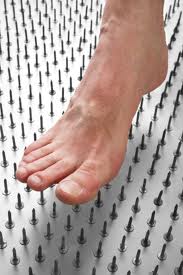Unresolved Peripheral Neuropathy? Contact Us.
Peripheral Neuropathy (PN) is one of the most common chronic diseases in the U.S. with over 20 million Americans suffering from it.
In this condition, “nerve damage” disrupts the body’s ability to communicate with its muscles, joints, skin, and/or internal organs. The body’s electrical wiring system breaks down, causing poor neurological communication, eventually causing a series of symptoms.
SYMPTOMS OF PERIPHERAL NEUROPATHY
The 7 most common signs of Peripheral Neuropathy are:
1. Numbness in your hands and/or feet.
2. Burning sensation in your hands or feet.
3. Cramping.
4. Sharp electric pain or prickling/tingling feelings.
5. Difficulty sleeping from leg discomfort.
6. Inability to walk long distances without pain.
7. Problems with balance and coordination.
Unfortunately, because of the above symptoms, patients with peripheral neuropathy are at 15 times increased risk of having a fall that can result in head trauma, hip injuries, and fractures.
This condition makes even simple daily activities almost impossible for people who have it and the people that love them usually find themselves unable to help in a significant way.
CAUSES OF PERIPHERAL NEUROPATHY
There are many causes of this condition. The most common are diabetes, Vitamin B12 deficiency, nerve entrapment or injury, smoking, chemotherapy, peripheral vascular disease, and prescription medication side effects, such as statins.
Regardless of its origin, the end result is a nerve that isn’t working normally. Interestingly, the most common diagnosed reason for peripheral neuropathy is “Idiopathic”, meaning that the cause of the nerve damage is unknown.
Sadly, this means that for most patients who have these symptoms, their doctors do not know why they are occurring and the typical approach then becomes to prescribe medication for symptomatic relief and never finding the origin. To make things worse, these medications themselves create a further toxic environment and often make the patient tired, fatigued, and groggy.
OUR APPROACH
Our approach to peripheral neuropathy is comprehensive. A functional neurological examination is first performed to determine the extent of motor loss, sensory loss, vibration sense, reflex brain coordination, and trophic changes.
Treatment options will revolved around the following 3 factors based on your unique findings.
- Metabolic Factors: Refers to the status of chemical factors including vitamins, minerals, proteins, inflammation, immune and hormonal factors that can impact nerve health.
- Physical Factors: Pinched, compressed, stretched, or irritated nerves are problematic. These must be free from bone, disc or fibrous scar tissue irritation along the entire path of the nerve, from the spine outward to the extremities.
- Neurologic Factors: The brain interprets every signal received from the peripheral nerves. A healthy brain interprets efficiently and likewise, sends out proper information. Overactive or underactive “firing” of nerve impulses is problematic.
Based on your unique findings, tests may include one or more of the following:
- Structural analyzes : x-ray, posture analysis, muscle imbalances, etc.
- Adrenal gland / HPA axis function
- Hormonal panels
- Liver Function
- Blood Sugar
- Oxygen perfusion / Saturation levels
- Gastrointestinal function
- Food Sensitivities
- Additional neurological testing when needed, such as EMG/NCV
Our approach is to help to reduce inflammation both locally and systemically, improve cellular and peripheral nerve nutrition, and re-sync brain/nerve communication.
We look forward to helping you.